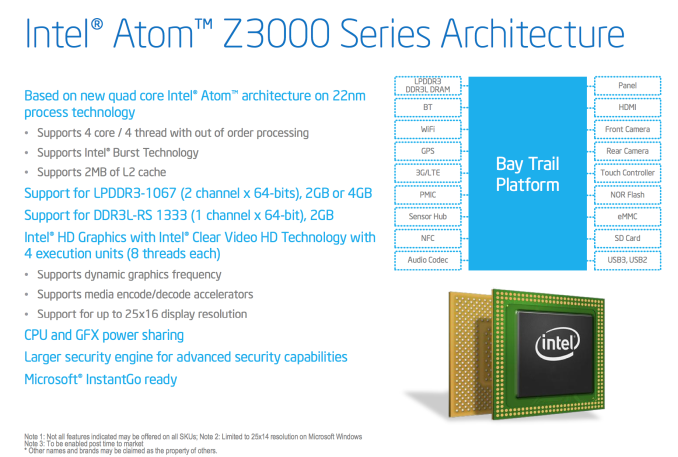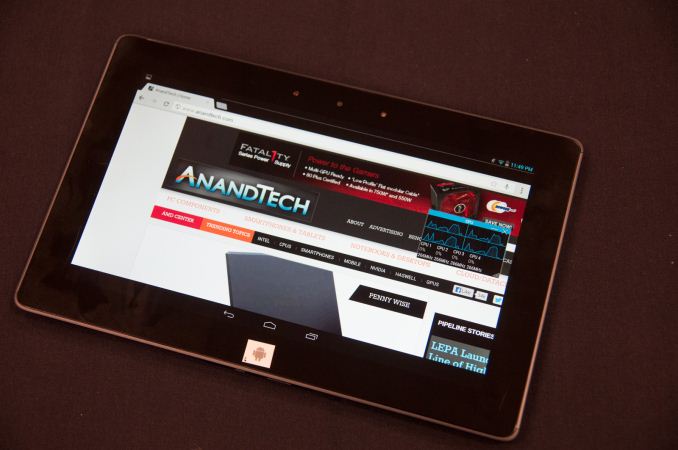The Bay Trail Preview: Intel Atom Z3770 Tested
by Anand Lal Shimpi & Brian Klug on September 11, 2013 12:00 PM ESTFinal Words
At its Silvermont disclosure, Intel promised performance better than any other ARM based core in the market today. Looking at our Android results, Intel appears to have delivered on that claim. Whether we’re talking about Cortex A15 in NVIDIA’s Shield or Qualcomm’s Krait 400, Silvermont is quicker. It seems safe to say that Intel will have the fastest CPU performance out of any Android tablet platform once Bay Trail ships later this year.
The power consumption, at least on the CPU side, also looks very good. From our SoC measurements it looks like Bay Trail’s power consumption under heavy CPU load ranges from 1W - 2.5W, putting it on par with other mobile SoCs that we’ve done power measurements on.
On the GPU side, Intel’s HD Graphics does reasonably well in its first showing in an ultra mobile SoC. Bay Trail appears to live in a weird world between the old Intel that didn’t care about graphics and the new Intel that has effectively become a GPU company. Intel’s HD graphics in Bay Trail appear to be similar in performance to the PowerVR SGX 554MP4 in the iPad 4. It’s a huge step forward compared to Clover Trail, but clearly not a leadership play, which is disappointing.
The big unknowns are things like video decode power efficiency, perf and quality of their ISP and idle power efficiency vs. Qualcomm.
Bay Trail looks like a good starting point for Intel in mobile, and the performance of Silvermont makes me excited for Merrifield in phones next year. What Intel needs to do going forward is simply continue to iterate and execute for the next few generations after Bay Trail and it will have a real chance at success in mobile.
My biggest concern is about the design wins we see based around Bay Trail. Although Intel is finally in a spot where it can be in devices on the market, none of those devices thus far have been any good. Bay Trail is attractive enough to garner more design wins for certain, the question is whether or not the quality of those wins will improve as well. In the tablet market there’s the iPad and the Nexus lines that are really the most interesting, and I don’t expect Bay Trail to be in either. Whether or not the quality of the rest goes up this generation and we find a Bay Trail in one of those devices remains to be seen.












190 Comments
View All Comments
name99 - Wednesday, September 11, 2013 - link
Uhh, his point is COMPLETELY valid.The actually existing usage models of these devices is very much short sprints for which high throughput is ideal, followed by long bursts of doing nothing. Yes, this doesn't match a particular class of games, and doesn't match whatever weird inappropriate process (like cinebench) that you want to run on your phone, but it matches how MOST people uses their phones (and tablets).
This is the one area where, IMHO, Intel have a clear advantage over ARM. But I suspect it is very much a temporary advantage. Apple, for example, obviously spent all their A7 design time getting the 64-bit in place, and on the remaining low-lying micro-architectural fruit. But I expect that for the next chip, this sort of ability, to turbo up to high frequencies for short periods of time, will be their primary focus.
romanov123 - Wednesday, September 11, 2013 - link
Well, how about Skype/Google hangouts or watching a movie? Most turbo benefits will also show up in launching apps.And as you say Apple still needs to figure out Turbo while Intel has launched a product with it.
Valis - Wednesday, September 11, 2013 - link
No x64? Guess I wont be getting one of these, right now then. I'd rather run Ubuntu on it than Android, since the latter is better for smartphones. Ubuntu being based on my beloved Debian that I have been using since the stoneage of linux. =)blandge - Wednesday, September 11, 2013 - link
Bay Trail supports 64bit for Windows and Linux.Valis - Wednesday, September 11, 2013 - link
Quote:"Although the core architecture is 64-bit in design, there will be no OS support for 64-bit Bay Trail at launch. Windows 8.1 with Connected Standby appears to still be 32-bit only, and obviously Android is 32-bit only at this point as well."
So, it's just the drivers and such missing? Ohh, okej then. :)
lmcd - Wednesday, September 11, 2013 - link
Yeah it's just the power optimizations landed in 32-bit first (probably easier plus 32-bit is all that's needed for these LP devices)RU482 - Wednesday, September 11, 2013 - link
Yeah, they said CedarTrail was supposed to have 64-bit support to, but then pulled the rug at the last moment. These BayTrail-t CPUs are going to be so short lived, don't expect much from Intel support after about January (if that long). They dedicate the resources to Airmont-tzeo - Wednesday, September 11, 2013 - link
Cedar Trail technically did but because it used Imagination GPU the driver support never materialized, especially after Intel decided to give up on netbook range ATOM and re-purposed it for the mobile market. Even some of the D Series Cedar Trail models were terminated in the same year of release.Bay Trail, though is using Silvermont architecture that is fully 64bit and is using Intel's own GMA based on a scaled down version of the Ivy Bridge HD4000... and Linux support for Intel's driver support was added back in April btw!
The only thing is Intel isn't pushing the 64bit advantage for mobile devices but Bay Trail is also going into Laptops and desktops/servers... specifically the Bay Trail M and D series that'll be sold under the Celeron and Pentium Brand names will be when they push the 64bit advantage but since it's the same architecture it means you should be able to get drivers for all Silvermont based devices...
Freddo - Wednesday, September 11, 2013 - link
I look forward to the day when these energy efficient processors are powerful enough to properly run a PS2 emulator, but it seems like I have to wait a few more years still.Dentons - Wednesday, September 11, 2013 - link
Yes, it's better than ARM, but is it better enough?Clearly, the answer is no. For most tablets and phones, it's not nearly better enough.
Convincing existing ARM vendors to move to Intel will not be an easy task. There will be huge costs involved. In order to drive such a move, Intel would need far better performance or a far better price point, but probably both. It seems unlikely that Intel has either. The performance is only minimally better than ARM's current offerings, and while we don't know pricing, given that Intel has the highest margins in the industry and ARM among the lowest, one must assume that Intel's new silicon won't be price competitive with ARM.
So where will these chips shine? The only place they seem likely to find a home is in full (non-RT) X86 Windows 8 tablets and phones. Windows is the only large mobile player that requires X86. For the rest of the market, X86 is a liability.
Intel may mark this a success if it kills off Windows RT. In that singular goal, these chips seem likely to succeed. Such a victory will do little to make Intel powered tablets competitive with Android. Full X86 Windows boxes will have the full duo of WinTel taxes. Because of this, it's hard to see these products ever being price competitive with Android, not to mention the dearth of mobile apps on the Windows platform.
Intel and Microsoft have allowed ARM and Android too large of a head start. Now, their lead may be nearly insurmountable.